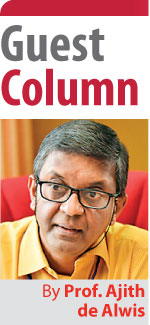Monday Feb 16, 2026
Monday Feb 16, 2026
Thursday, 26 May 2022 01:25 - - {{hitsCtrl.values.hits}}

It is a sad situation – Pic by Shehan Gunasekara
 Poor Alice with so much debt – and of course not of her own making – is now stranded in the isle of ingenuity. Even though the isle is known this way, Alice feels it is more of a Debtland than a Wonderland. Overall the citizenry of Debtland knows that they need to pay around $ 51 billion but only have less than a few million USD in the kitty. Certainly an ICU scenario with the number varying with heart-breaking speed!
Poor Alice with so much debt – and of course not of her own making – is now stranded in the isle of ingenuity. Even though the isle is known this way, Alice feels it is more of a Debtland than a Wonderland. Overall the citizenry of Debtland knows that they need to pay around $ 51 billion but only have less than a few million USD in the kitty. Certainly an ICU scenario with the number varying with heart-breaking speed!
There was a time when the poor Alice was not exactly aware of the growing debts as that was not felt by her. Times have passed and the issues are felt at each pore of the body. Of course, in some quarters whether this is still evident is questionable but the feelings are mutual with many millions showing signs of collective distress. It is a sad situation. When some few metric tons of food items are received at the harbour it appears to be a situation to rejoice though not all the faces openly declare that feeling. The fact a gift of such a nature could ensure the top to be present shaking hands and exchanging pleasantries (I believe) is a sad indictment of our efforts so far.
Are we expecting the outside from any quarter to bail us out, sustain out for a period and lift us and dust off the dirt from our backs and straighten us and make us more presentable to the world?! Our attitude appears to have someone who’s acceptable to the outside enabling forex to flow in. Forex in any means with the usual rewards that the nation has moved on in the past – be those may be vehicle permits and school placements, etc. – are rushing out from policy corridors. Desperate situations are not realising innovative solutions. The set of recipes is not convincing at least to some who may be seeing more into the distance with a long-term perspective.
Rushing to correct the cardinal sins such as restoring taxes, and quickly addressing the drain points with constitutional amendments are not happening, and as such, the State is still resorting to the printing press to sustain the record-breaking public sector. The earlier remark of ‘Eda Wela Tours’ is becoming true across the board. The timetable of ships arriving at the harbour is top news and it is important to understand that the show cannot go on like this. We are now engaged in the dilemma of defining essential services. Now there is the interesting option of reconsidering the rest once having declared oneself to be not essential!
Alice needs an answer and the good thing about her is that she is not ready to depart and also interested in contributing. She understands well that there is one goal worth pursuing and not going down any road leading to anywhere. At least Alice is keen to see a roadmap. There may be mileposts with difficult-to-digest signposts to read but those need to come to light. At least that would give the assurance some are trying to do something. The measures must indicate the seriousness of purpose and should have meaning and depth.
We have indicated that we do not have the ability to negotiate terms and conditions and debt restructuring, etc. and seeking the services of some who are supposed to have the world’s best practices. This effectively implies our collective ability to get into a mother of all mess but not have a clue on recovery. This is not good as we would be at the mercy of idea lenders at cost.
One has to admit that specialist services of the highest order are required when you are placed critically in an intensive care unit and that is where we are with even more dire predictions of we haven’t seen anything yet! Now one obvious area where more shocks are expected to come from is when the most important Yala season crop fails to deliver. This is the season where two-thirds of the output is usually given. The equation is not too difficult to understand as the inputs to the equation had gone missing from day one and that kind of clinches the likely answer.
We have International Monetary Fund technical meetings and multiple discussions across specific sectors going on. Prescriptions are likely to result from not many choices offered. However, in Alice’s view, some of the essential prescriptions are unlikely to materialise from such organisations as they are structural in nature. Some elements of economic productivity are unlikely to be discussed. Two areas are bringing in manufacturing and others like transforming into a circular economy. Moving forward with a national manufacturing strategy has to come in and be executed.
A circular economy would ensure that the economy is moving towards a future-fit condition and we would be looking at resources of all types to be managed with the highest productivity. Scenarios like shortening supply chains and avoidance of waste ensure significant resilience. For starters, we would not be tolerated 50% food losses and unsustainable consumption patterns. Where corruption has taken root, privatisation as the solution may be what is handed out but that should not be so as well.
Alice understands that she has to be aware of a broader range of issues if she is to contribute in her way. She dived into Jeffrey Sach’s ‘The end of poverty – How we can make it happen in our lifetime’. She sighs seeing the term – lifetime! She also believes in knowing your counterpart and that leads to her reading John Perkin’s ‘Confessions of an economic hit man’ and the more recent ‘The New Confessions of an economic hitman’. Alice sighs again after going through all three and they do not lend themselves to easy digestion. Passage of time over the reading of these books has seen the rupee coming out of the slump and even consolidating in some way.
The rupee appears to have improved in its relationship to the dollar in the meantime due to some measures taken by the Central Bank. One begins to wonder when observing the logical simplicity of some of the rules, whether we have just had a blind eye to malpractices over the years. Of course, we know the spread of cancer of corruption. Alice interestingly is a scientist with a healthy attitude towards its use via technology. If reading the three books made her heavy and downhearted reading the KIST story from South Korea lifted her spirits.
To see that a country is elevated through the combined action of one scientific organisation of course with the strong committed support of the leadership (General Parks) lifted her spirit and strengthened her resolve that S&T can deliver and also the solution for her Debtland. Of course, there is the imperative for the political leadership to believe in this means. She also felt kind of emotional after realising a subsequent leader who happened to be the daughter of the General who gave the country the opportunity is now in prison over proven allegations of corruption – influence peddling!
No amount of science and technology can help if corruption is rampant and the attitude of the decision-makers is not toward reducing corruption to the lowest possible. The fact that to realise such ends political maturity within the masses too are necessary. Different scenarios require different types of leadership and this is what the Founder Vice-Chancellor of the University of Ceylon explained to the local audience when they were surprised by the public electing Atlee over Churchill as the PM in the UK after Churchill having led the UK to victory in WWII. It is not political ingratitude but political maturity which replaces a Churchill with an Atlee after the war is over was what Ivor indicated. He indicated that it is not political ingratitude but political maturity when the society at large understands what is required for the situation should not simply be judged by an action of the past.
While Sri Lanka too needs political maturity we would need the STEM thinking and practice to get us out of the woods on the most decent path possible. An attitudinal change of some significance is necessary and therein lies another challenge for us. Multiple changes in our attitude and practices are imperative. Within the Parliament significant respect for science and technology has to come in and perhaps a mechanism is necessary to place everyone on the same page when it comes to scientific evidence-based decision-making. Members of the institution must understand the follies from the past and come to the viewpoint enough is enough!
If they need some solace Alice thought, remembering the psychologist William James, who indicated that the greatest discovery of his generation is that a human being can alter his life by altering his attitude. She wrote down must have changes which included the resource-draining political establishment needs pruning from top to bottom and that is possible with the constitution. How about a decent level of education to be eligible in the first place as the current situation is laughable!? If PCs cannot be deleted why not district level instead of this plethora of PSs? S&T can do so much in this small country and there is no need to have people representatives for each square kilometre.
Alice decided to have a short rest as in the Debtland as life is not like in the Wonderland. Your energy gets quite quickly zapped. She understands that she has a hard road ahead.